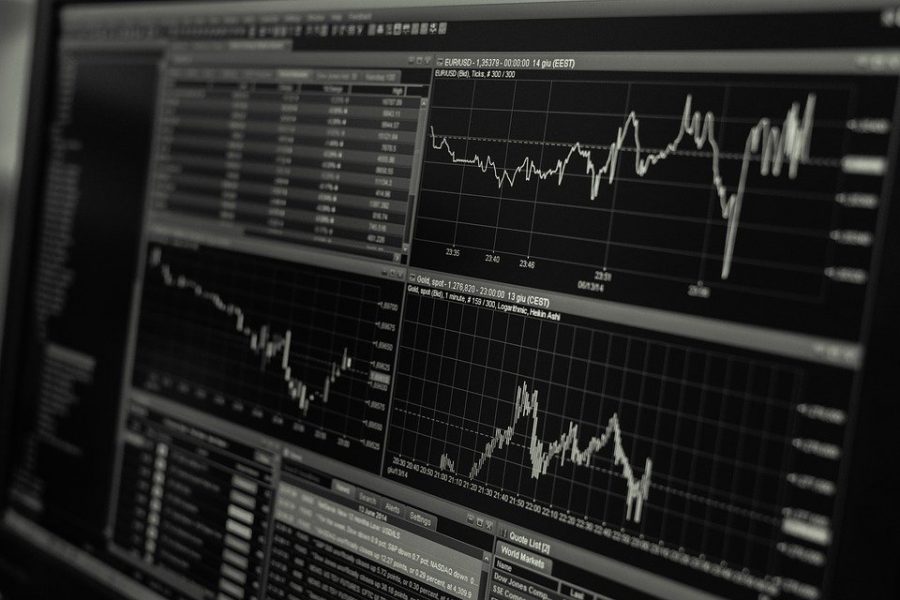The Pros and Cons to Percent Share Investing
February 10, 2021
Here is a riddle for you, what is obsolete but has the power to disrupt one of the strongest economies in the world? If you answered GameStop, somehow, you are correct. A company that has seen its business being slowly chipped away by introducing online gaming was the source of one of the craziest financial headlines in recent memory due to the stock price soaring at a seemingly random time. The truth is that the timing was not random at all if you are inside certain social circles.
Before discussing why this happened and what that means for the long-term outlook of the stock market, let us shed some light on the events leading up to the event and give some background on the stock market.
Simply put, the stock market is a thermometer, but instead of mercury as the indicator, it is made up of a network of, for lack of a better term, gamblers that invest money in various companies based on their opinions. When enough money is invested into a particular stock, the market feels there is widespread confidence in that company. Thus the value of that stock increases. For many years, the stock market has been controlled mainly by people with generally large pockets supporting the famous adage, “it takes money to make money.”
That was the case until a young startup had an idea to create percent sharing of stocks, so now, instead of needing to buy a stock, someone can buy part of the stock for the equivalent value. For example, let’s say someone wants to invest in Amazon stock, which is currently valued at $3,000 per share (rounded down for simplicity’’s sake), but they only have $30 to invest. With percent share investing, they can buy 1% of a single share and see the benefits when Amazon stock performs well. While they would not make as much as someone with a whole share, they can still partake in the economy and grow their wealth with suitable investments.
Thanks to the startup Robinhood, the market saw many new investors, especially amongst a younger demographic. This effect was shown in the market with so-called “younger” brands and individual tech stocks like Tesla considerably outperforming their expected growth. While this effect was noticeable, it did not shake up the market in a way that could not be predicted with a few adjustments by larger investors.
This is where GameStop comes into play. GameStop as a company has been slowly going the way of Blockbuster, which is an in-person store that has not adapted well to the digital age and is slowly being phased out, a trend that was only exasperated by the vast digital shift due to Covid. The stock value has slowly been decreasing to the point where it is expected to go out of business.
A large investor decided to “short” the stock, which is simply a way to bet that a stock will decrease to profit from losses. This investor decided not only to shorten the stock but to publicly trash the stock in the hopes of driving the value even lower faster so he could make more money.
Unfortunately for his investor, he angered a large dedicated group of gamers and small investors who did not want to see the brand they have known and loved be trashed publicly. This group took to Reddit and encouraged everyone to buy as much GameStop stock as they could in hopes of supporting the brand and rebelling against the deep pockets of wall street. Instead of saving the stock, though, that large influx of many small investments caused the thermometer to sense strong confidence. Thus, the value soared to unbelievable heights for a brand essentially going out of business. The stock price increased nearly 100 times the value. Those small investors made an unbelievable amount of money. One case reported a 15-million-dollar increase in the matter of a week. While it will eventually recover and prices will return to more expected values, the stock market was shaken up by the thought of this same thing happening again with different brands.
For an extensive overview of the effect of percent share investing, it has many positives. More participants in the market mean a more accurate representation of our economy and more money going back into the system. This helps growth and can help distribute wealth without having to take it from people directly. On the downside, there is the opportunity for market manipulation due to large individuals, internet groups, or even influencers supporting certain brands and encouraging others to buy-in. That can lead to an extremely volatile market that can be dangerous, especially for people who might not know the stock market’s ins-and-outs. There will likely be many more market manipulation lawsuits opened as a result, such as a case being levied against Robinhood led by Dave Portnoy from Barstool Sports, but that is a discussion for another time.
Percent share investment is good, and the best time to invest is while you are young. Even if you are only investing that extra dollar, you saved by not drinking a coffee on a given day. With the right research, anyone can use the stock market to invest safely and better their economic position.










